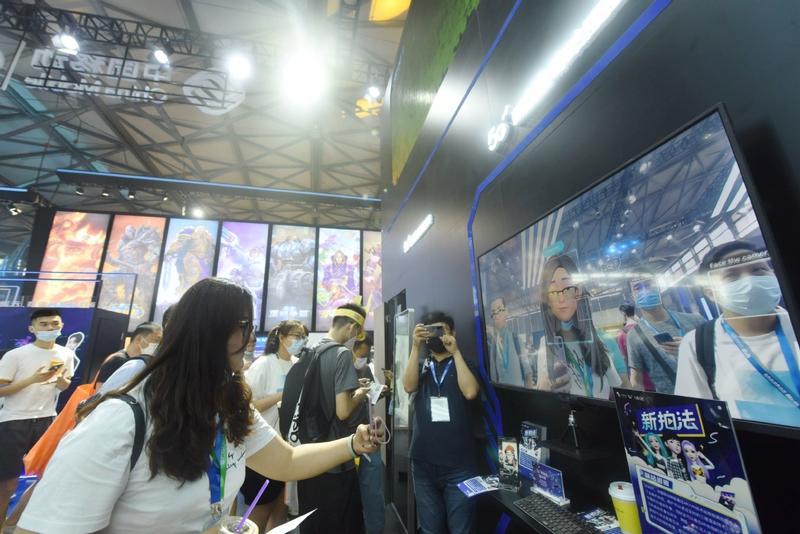 A visitor checks out a 5G-enabled deep-fake product during a digital event in Shanghai in July 2020. (PHOTO BY LONG WEI / FOR CHINA DAILY)
A visitor checks out a 5G-enabled deep-fake product during a digital event in Shanghai in July 2020. (PHOTO BY LONG WEI / FOR CHINA DAILY)
China already matches the United States in artificial intelligence technologies but needs more efforts to build the next generation of AI infrastructure, so that AI can drive various industries, industry insiders said.
"As more and more enterprises leverage data and computing power to drive their growth, the AI industry keeps expanding at an unprecedented speed. China will soon surpass the US in terms of market scale," said Tian Tian, CEO of RealAI, a Tsinghua University-backed, Beijing-based AI company.
However, quite often, companies from traditional industries are not able to use their data in a sufficient way due to factors like strong privacy protection laws and complicated application scenarios, which has slowed down AI industries.
The next generation of AI infrastructure should be based on data security, along with reliable algorithms and credible applications. For instance, it can make facial payment systems more secure so that the industry's overall efficiency can be boosted, said Tian Tian, CEO of RealAI, a Tsinghua University-backed, Beijing-based AI company
"Therefore, it is necessary to first enhance the basic capabilities of AI to build a new generation of AI infrastructure, which can truly empower the high value of AI in various fields, including finance, industry, security, 'new infrastructure' and mining industries," he said.
The next generation of AI infrastructure should be based on data security, along with reliable algorithms and credible applications. For instance, it can make facial payment systems more secure so that the industry's overall efficiency can be boosted, he said.
The move came as Chinese regulators recently summoned 11 domestic technology companies including Alibaba Group, Tencent and ByteDance for talks on use of deep-fake technologies on their content platforms.
Deep-fake mainly leverages AI to create hyper-realistic but fake videos or audios where a person appears to say or do something they did not.
"Behind deep-fake technologies is the critical problem of AI safety problems for countries worldwide. Many current AI systems are actually fragile and it's easy for hackers to forge," Tian said.
ALSO READ: AI now most favored major at universities
Zhang Bo, president of the Institute of Artificial Intelligence of Tsinghua University and an academician at the Chinese Academy of Sciences, said although AI develops fast in China, it has been able to make breakthroughs only in image and speech recognition so far.
"Once the AI system meets with scenarios such as lack of data knowledge and incomplete information uncertainty, the current generation of AI system can help with nothing,"Zhang said.
"Therefore, it is urgent to build the next generation of AI technology that is safe, reliable, and credible, so as to empower the next stage of AI development," he said.
To meet demand for such technology, RealAI developed RealSecure, the first compiler-level privacy-preserving machine-learning platform.
The platform is able to automatically convert ordinary machine-learning algorithm programs into distributed, privacy-safe programs.
The startup also upgraded its RealSafe, which is the world's first enterprise-level AI security platform and is equivalent to anti-virus software and firewalls for AI models.
Tian said that the upgraded platform is able to offer offensive and defensive capabilities for algorithms and embeds functions like backdoor vulnerability detection.
READ MORE: China's financial hub wants to be global AI powerhouse
Founded in 2018, RealAI was incubated and backed by Tsinghua University. The company aims to overcome shortcomings of common deep-learning models and enhance the reliability, credibility and security of AI in a fundamental way.


